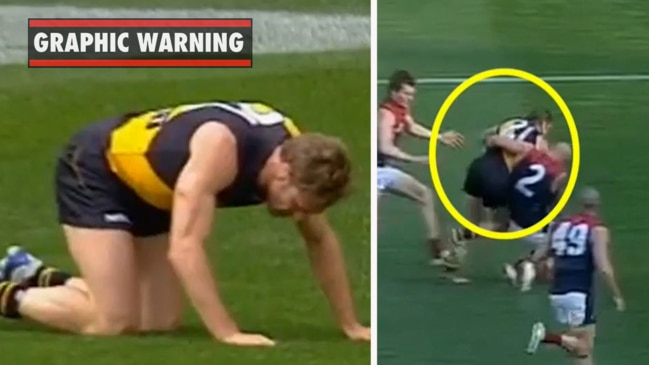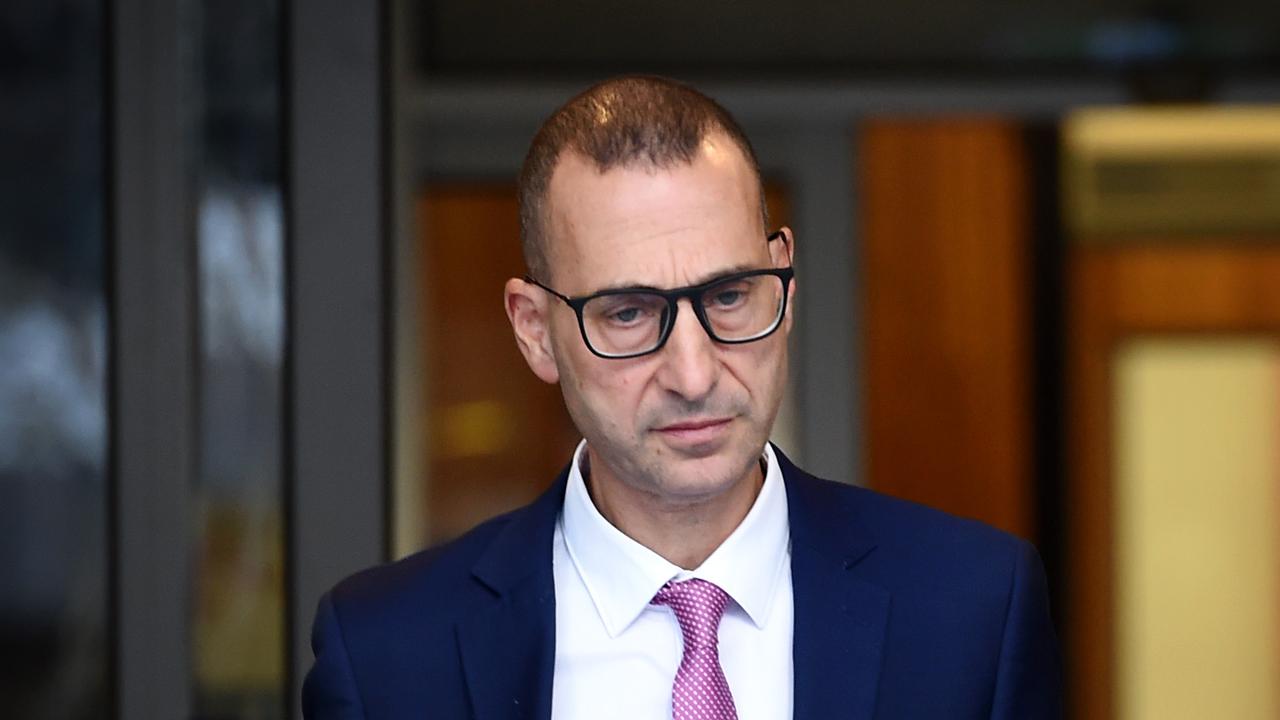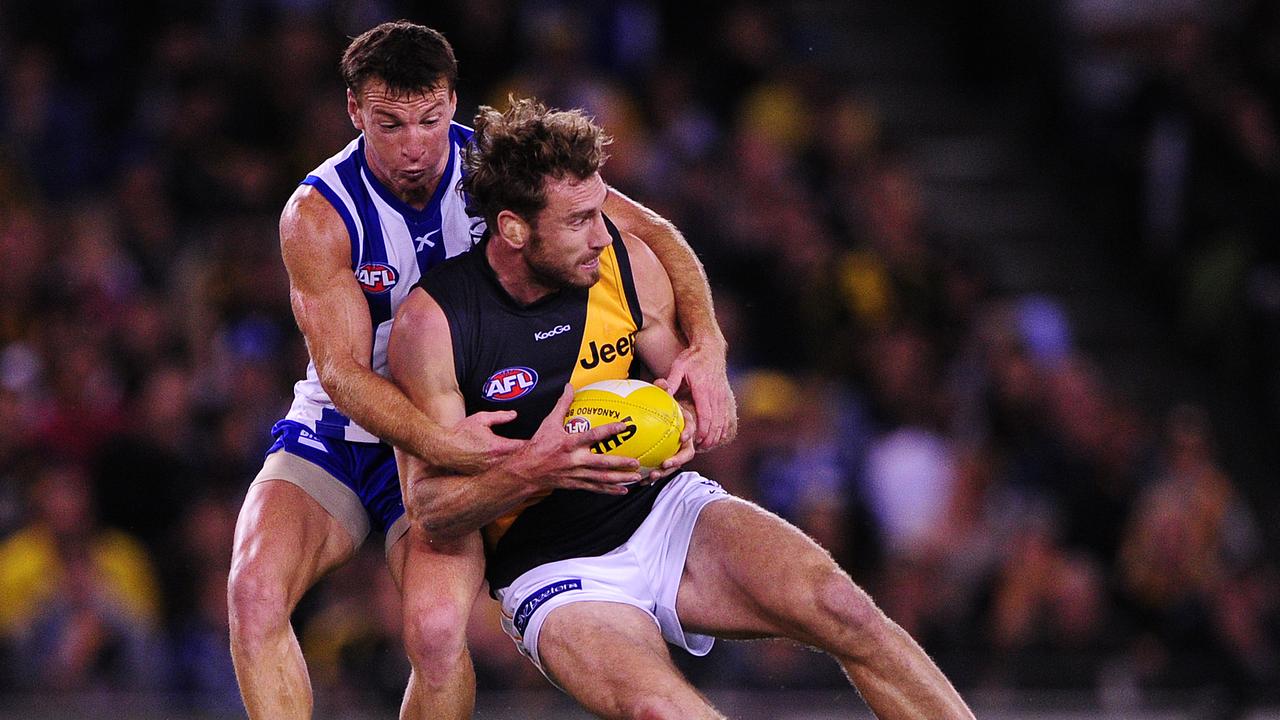AFL star’s sister tells inquest Shane Tuck died with a ‘war zone’ inside his head
Former Richmond Tigers star Shane Tuck died with his brain “rotting away” after a career of head knocks, his grieving sister has told an inquest.

Former AFL star Shane Tuck died facing a “war zone inside his head”, his grieving sister has told an inquest in emotional testimony.
Appearing in the Victorian Coroners’ Court on Friday afternoon, Renee Tuck said facing a court was hard but she hoped what she had to say would help ensure the health and safety of Australia’s athletes.
“I have heard bystanders say, ‘They play footy, they know what they’re getting into or they get paid enough’, this is not true,” she said.
“Our fight against CTE (chronic traumatic encephalopathy) began in May 2019 when Shane’s wife called us from Adelaide.
“Shane hadn’t been himself for a long time but we didn’t know what CTE was … We had no idea of the horror show that would follow.”

Tuck died by suicide at the age of 38 in July 2020 and was found to have suffered from severe CTE – a degenerative brain disease thought to be caused by repeated head trauma.
He played 173 games for Richmond Football Club between 2004 and 2013, later having a brief boxing career after his retirement.
An inquest into his death, headed by State Coroner Judge John Cain, is looking into Tuck’s death and whether it was linked to CTE.
Under the microscope are the sports’ policies around head knocks and concussions and whether they protect the wellbeing of their players.
Ms Tuck told the inquest her younger brother was tough and had always put his body on the line for the sport he loved, but the degenerative disease had slowly destroyed him.
“CTE is real and it is unrelenting,” she said.
“It brings a strong man absolutely to his knees and in Shane’s case to his death. He pushed through hell to stay with us for as long as he could.
“Little did we know his brain was rotting away … Shane’s final days on earth was a war zone inside his head.”
She said the impact of his condition became so great he began hearing voices and suffering debilitating headaches, with medication not “even touching the sides of his distress”.

The inquest was told AFL players could soon be wearing helmets and smart mouthguards amid measures to reduce traumatic head impacts thought to cause the brain degeneration disease.
Giving evidence on Friday, the AFL chief medical officer Michael Makdissi said the organisation was “determined to protect the welfare of players”.
“We haven't waited for directional people to tell us, we’ve had the priority, or basic principle, of reducing head contact and the associated issues for a long time,” he said.
Asked about the AFL’s efforts to reduce head impacts linked to brain injuries, Dr Makdissi said there had been more than 30 rule changes since 2005 to “encourage and enforce behaviour change on the field”.
“We know repeated head trauma has an association with longer-term problems,” he said.
“These are larger cross-sectional studies looking at retired players. What you see across a range of sports is there’s a higher proportion of neurodegenerative diseases such as dementia or CTE.”

Dr Makdissi told the inquest the AFL was involved in ongoing research into measures to reduce head impacts and “AFL-specific headgear” could be introduced as soon as the 2024 season.
“Initially, they’re likely to be voluntary,” he said.
“You need to be able to measure the benefits and the unintended consequences, like players playing differently.
“I wouldn’t mandate them initially … we would look at mandating down the track if there are these benefits.”
He said research was under way into mouthguards with built-in accelerometers to measure the number of incidents of head trauma.
The initial phase of research is expected to end later this year, with a rollout “as early as next season”.
“Ideally, we have all players wearing it all the time if the devices is valid and reliable,” Dr Makdissi said.

Both pieces of technology, Dr Makdissi said, would also be rolled out into the community level of the sport.
Dr Makdissi has defended the organisation’s efforts to mitigate traumatic brain injuries among players.
He said every effort was being made to deter behaviour on field that led to head impacts, but the sport was mindful to not deter people from playing.
“We need to make sure we’ve got a balanced and measured message about it,” he said.
“We don’t want people dropping off physical activity over time because of heightened or overstated concerns.”
The inquest concluded on Friday afternoon, with parties given three weeks to make written submissions before Judge Cain hands down his findings.




